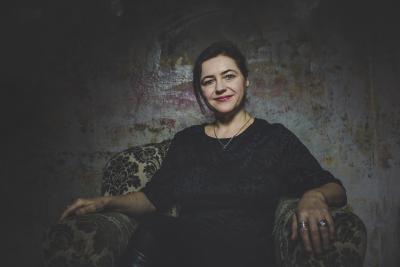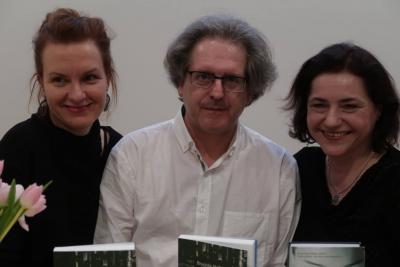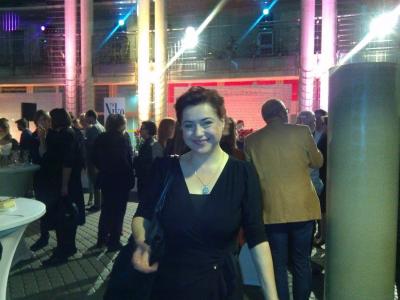Brygida Helbig

Brygida Helbig (actually Dr Brigitta Helbig-Mischewski, pseudonym Anna Maria Birkenwald, Professor at the Adam Mickiewicz University in Poznań) was born in Szczecin in 1963. After completing her school leaving examination at the renowned grammar school “II Liceum Ogólnokształcące”, she began studying Polish studies in her home town at the Higher Pedagogical Institute (Wyższa Szkoła Pedagogiczna), the forerunner to Szczecin University (Uniwersytet Szczeciński) which was founded in the 1980s. At barely 20 years of age, Helbig decides to leave Poland mainly for personal reasons. In the early morning of 1 November 1983, she leaves the train at Wanne-Eickel station in North Rhine-Westphalia and settles in Herten in the Ruhr region. She then temporarily up sticks and moves to the Dutch border. In Anrath near Krefeld she attends a language school for late repatriates. She is then able to attend the college for late repatriates in Geilenkirchen, where she completes her German school leaving exam in 1985, before studying Slavic and German studies at the Ruhr University in Bochum. In 1991, one year after her first academic qualification, she is awarded a doctoral scholarship by the Cusanuswerk [scholarship body of the Catholic Church in Germany]. Her doctoral thesis is on Maria Janion [Polish literary scholar] and dedicated to the new-age discourse in the Polish literature of the 1970s and 1980s. In 1994, she is awarded a doctorate at the Ruhr University in Bochum, where she also founded the student literary club “Dichter-Fressen” with Professor Michael Fleischer.
Brygida Helbig’s first literary texts appeared in the mid-1990s in the magazine “FA-art”. The novel “Pałówa”, which was published in Danziger Verlag “b1”, was born out of the fragments of a story about a young woman growing up in socialist Poland that had been published in the magazine. Prior to that, the author publishes poems and reviews in “Kolano” (The Knee), the house magazine of the “Club of Polish Failures” (Klub Polskich Nieudaczników). At the same time, she works in the academic field giving lectures and seminars to students at the Institute for Slavic Studies at the Humboldt University in Berlin, where she is employed until 2005. During this time, she is twice awarded the prize from the Faculty of Philosophy at the Humboldt University in recognition of her pedagogical work. In the years that follow, she works at Karls University in Prague and at Szczecin University as well as at the German-Polish Research Institute at the Collegium Polonicum in Słubice, a branch of the Adam Mickiewicz University in Poznań (Uniwersytet Adama Mickiewicza w Poznaniu, UAM). Her academic texts and works of literary critique in the fields of cultural studies, history of literature, intercultural communication and feminism and topics about gender appear in numerous magazines, for instance in the “Zeitschrift für Slawistik”, in “Teksty Drugie”, “Twórczość”, “Pogranicza”, “Odra”, in the “Anzeiger für slawische Philologie” and in many other periodicals. Helbig also regularly writes radio broadcasts for the Polish editorial team at the Berlin radio station COSMO and she writes for the “Tagesspiegel”, “ZEIT ONLINE” and “Gazeta Wyborcza”, to name but a few.
After the chair for Slavic Studies at the Humboldt University closes in 2005, Brygida Helbig continues her academic work by writing essays and books about exile literature and about the “Club of Polish Failures”, about the crisis of masculinity, about Henryk Bereska, Olga Tokarczuk and other female authors of her generation, as well as about the trauma of the generations in the novels of Inga Iwasiów and Magdalena Tulli, about the autobiographical “post-GDR literature” and about the Polish author Bruno Schultz, and many other creators of literature, with more and more time being devoted to her own work as a writer. In 2005 the grotesque novella “Anioły i świnie. W Berlinie!“ (“Angels and Swine”) is published and makes her famous. In this story from the migrant and campus milieu, which humorously tells the story of Polish immigrants to the Federal Republic, she plays around with classic prejudices and forces the reader to reflect on how it is possible, through unavoidable adaptation, to find one’s place in a world in which one simply ended up and which still isn’t that familiar, even after years of living there. The female version of a “sausage emigrant” was inspired by the novel “Klub Kiełboludów” by Leszek Oświęcimski (“Club of the Polish Sausage Men”). One of the key advantages of Helbig’s novel is in its continuous irony, about which Przemysław Czapliński writes in the “Gazeta Wyborcza” as follows: “Irony overtakes everything: the Germans, our emigrants, the female protagonist, but also the schematic, seemingly banal narrative pattern of the novel. If Helbig as a Pole describes herself and her countrymen as ‘Swine in Berlin’ and if she portrays how these ‘Swine’ demand their individuality, then she certainly doesn’t mean ‘the Polish Swine”. Therefore, she doesn’t adopt the perspectives of others. What she writes, contains a lot of sorrow but also life, as well as a lot of melancholic smiling and courage.”[1]
In a sense, the motif of alienation and revolt in “Angels and Swine” returns with double the impact in Helbig’s “Enerdowce i inni ludzie“ (“East Germans and Other People”) from 2011. This anthology contains satirical stories about the fate of former GDR citizens, so-called “Ossis”, in the united Germany and their attempts to find their way in the new reality. But as it turns out, the Federal Republic of Germany – the country which many have dreamed of and believed that milk and honey flow there – is not as open and sympathetic to the new citizens as it appeared to be from behind the wall that separated the two states. The difference in mentality between East and West does not abate, in fact the protagonists become more and more unsettled by it. What remains is the unprocessed trauma which, in the best case, turns into a limitless nostalgia towards the lost country and the feeling of being disadvantaged by unfulfilled hopes. At the same time, Helbig shows the characteristics of the “Ossis”, who could help to make the world in the West “more human”. In 2012, the collection of stories “Enerdowcy i inni ludzie” was commended by the jury of the renowned Polish “Nike” literature prize with a nomination. Helbig also reached the final of the “Gryfia” literature prize with this book. The Berlin “Teatr Studio am Salzufer" also developed a play based on this book entitled “Pfannkuchen, Schweine, Heiligenscheine” (“Pancakes, Swine, Halos”) with director Janina Szarek.
Brygida Helbig makes no secret of the fact that her literary texts contain distorted biographical details. In that sense, the novel “Niebko” (“Little Heaven”) is her most personal work to date. It describes the complex stories of the families who ended up in the Polish western territories, particularly in Szczecin, after 1945. The protagonist of the novel, Marzena, “patches up the fortunes of her family, and of herself in the process, by telling a story that is somehow familiar. In the story, two family lines intersect, both from the East, both marked by the experiences of the war, the occupation and the resettlement in their regained territories, both trying to find their place in the reality of the People’s Republic of Poland.”[1] Against the background of the displacement, the exodus, and the violence, and by portraying the stories of her forebears, that came from the Polish eastern territories (and were later deported to Kazakhstan ) on the one hand, but on the other hand came from the south west of Germany, settled towards the end of the 18th century in Galicia and lived since then among Polish, Jewish and Ukrainian neighbours, Brygida Helbig magnificently presents a mix of stories and cultures in a country that only seems to be homogeneous. In “Little Heaven” the feeling of alienation comes up once again but with an undertone of hope which grows from the ability of people to adapt again and again to new living conditions. This novel was also commended by the literary critics and in 2014 was among the seven finalists of the “Nike” literature prize.
In 2016, Brygida Helbig’s novel “Inna od siebie” (“Different from Them”), which tells of the writer Maria Komornicka, who decided in 1907 at the age of 31 to burn her clothes, then dress as a man, and then declared that she was a man. Komornicka, who since then has called herself Piotr Odmieniec Włast, refuses to be treated as a woman. However, sex changes are not tolerated in her circles. The author, who had previously been considered talented, has been excluded from cultural life. The family shoves Piotr Włast in a psychiatric institution, before he moves permanently to live with his brother’s family on the family estate in Grabów nad Pilicą [town south of Warsaw on the Pilica river]. “Inna od siebie” made it to the final of the City of Warsaw Literature Prize. The play “Maria K.”, directed by Agnieszka Bresler, was based on this novel. The story of Maria Komornicka or Piotr Włast has followed Helbig for years, ever since she habilitated in 2004 at the Humboldt University in Berlin with a piece of work about the literary work of Komornicka. Her habilitation thesis was published in Germany a year later under the title “A Coat made of Stardust. Gender transgression and madness in Maria Komornicka”, this was followed in 2010 by the Polish version as “Strącona bogini. Rzecz o Marii Komornickiej“ (“The Fallen Goddess. About Maria Komornicka“). “By really looking into Komornicka, I understood that it’s time to face up to the past and the reality, to become familiar with oneself, and that one shouldn’t make one’s own feeling of self-worth dependent upon the acknowledgement of others. (...) Thanks to her I have understood my own decisions and my own part in a situation. I have also understood the part of others and in fact of those who find it hard to accept the differentness of others, the reluctance to adjust and the other sensibility.”[2] – Brygida Helbig wrote this in the “Gazeta Wyborcza” about the role Komornicka played in her life. „Strącona bogini” was awarded the Dean’s Prize at the University of Szczecin.
As well as her literary and academic work, Brygida Helbig is also involved in a number of different initiatives. She organises and moderates readings, sometimes in collaboration with the German-Polish bookshop “Buchbund” in Berlin, and she leads literary writing workshops. Academically, she supports the activities of the University of Three Generations/Universität der Drei Generationen/Uniwersytet Trzech Pokoleń in Berlin, which was established with her help in October 2014, and which is a platform for dialogue and the exchange of ideas for both Germans and Poles. Her services have also been recognised by Polonia, Polish communities living abroad. In 2016 Brygida Helbig was awarded the “Golden Owl” in the Literature category in Vienna for her novel “Little Heaven”. The prize is like the Oscar of the Polonia and is awarded to Poles and foreigners abroad who make a contribution to promoting friendly relationships with Poland.
The feeling of being different, the search for one’s own identity, the emigration, as well as the inside, the revolt and the resurrection from the ashes, all of these are familiar to Brygida Helbig from her own experience and are also an unshakable part of her creativity, although the author doesn’t see herself as an exile author. She sees some of the valuable aspects of living and working abroad as being: “a fantastic opportunity to experience foreign culture from within. The enriches us enormously as long as we don’t close ourselves off to differentness and don’t look at the world in rigid, cliché-ridden categories ... After several years of immersing oneself in the local reality, it is no longer possible to retain the typical “Polish” identity. A new identity of the person emerges which, on the one hand, is uprooted but, on the other hand, is at home in two places , even if he only has one leg in each culture.”[3]
Monika Stefanek, October 2019







